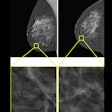
PITTSBURGH - Artificial intelligence (AI) will persistently and pervasively enhance all aspects of radiology, enabling precision medicine and potentially even finding disease before it becomes symptomatic, said Dr. Keith Dreyer, PhD, on Thursday at the Society for Imaging Informatics in Medicine (SIIM) annual meeting.
AI will expand today's decision-making capabilities for both current and new imaging modalities, leading to greater detection and treatment of disease, according to Dreyer, who is vice chairman of radiology at Massachusetts General Hospital and director of the institution's Center for Clinical Data Science. He discussed how medical imaging could harness AI in radiology during the opening session at SIIM 2017.
"Meaningful AI will improve quality, efficiency, and outcomes," he said. AI will "utilize all of the data -- not just images -- to optimize patient care."
Radiologists should embrace the use of AI, he said.
"It's not man versus AI; it's man with AI versus man without AI," Dreyer said. "You don't want to be the last person in the last century; you want to be one that has [AI] first."
Replacing the radiologist?
Google fellow Geoffrey Hinton said in October 2016 that within five years, deep learning will perform better than radiologists and the training of new radiologists should stop now. But replacing radiologists won't be easy, according to Dreyer.
Radiologists play many roles in the imaging process, and they are capable of handling all of the imaging domains and modalities. Developing an AI algorithm for even a narrow, specific application -- such as quantifying a posterior cruciate ligament tear -- requires extensive datasets that have been verified and annotated for training and testing.
Dreyer also pointed out that there are 2,613 radiology findings and 23,373 conditions, according to Dr. Charles Kahn Jr.'s radiology Gamuts. For AI, the 2,613 findings represent a quantification task, while the 23,373 conditions are an interpretation task.
Algorithms that perform quantification would be considered a class II medical device by the U.S. Food and Drug Administration (FDA), requiring a 510(k) application, while algorithms for interpretation would be deemed a class III device, necessitating the more rigorous and time-consuming premarket approval (PMA) process.
The 510(k) "needs months for approval and [the PMA] takes years," Dreyer said. "And there is a difference in dollars as well. So I think the 'findings' will be accomplished first, and that would be amenable to assist radiologists."
Spotting disease earlier
Further down the road, a perhaps even more exciting opportunity for AI is catching disease in patients before symptoms occur, Dreyer said.
"I think we're going to see a lot of opportunity in that space," he said.
This could include using AI to monitor biosensors and to assess genetic information for predisposition to disease.
"So how far back could we go [in the progression of disease] and be able to use [AI] to be able to get a better cure [for patients] -- and not just the way we do diagnostics and screening today," Dreyer said. "And you can apply AI in all aspects of this."
AI in clinical diagnosis
Imaging modalities contain much more data that can be shared with humans, and AI will be applied to tap into that additional data. In addition, AI can help radiologists in their interpretation process by providing them with context-aware information, Dreyer said.
Incorporating AI quantification for radiology can also enable precision healthcare, according to Dreyer.
"We've added incredible value by improving visualization [in imaging technology]; we can now use AI quantification to get us to ... precision medicine," he said. "While we've had incredible subjective information [in radiology], we can now have objective information."
ACR initiative
Embracing AI in radiology was the theme behind the May 21 launch of the American College of Radiology (ACR) Data Science Institute, Dreyer said.
The ACR Data Science Institute will bring together physicians, technologists, the IT industry, data scientists, informaticists, and patient advocates to spur AI forward and address the many challenging issues and hurdles that need to be cleared to facilitate the adoption of AI in radiology.
The institute's initial focus will include defining strategic use case categories to maximize patient care; optimizing patient safety, interoperability, and regulatory processes; and promoting the integration of AI solutions into clinical practice, Dreyer said. The institute will also provide ongoing AI verification, both before and after FDA approval.




















